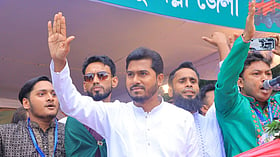Bangladesh Political Tensions Rise with Military Action
International International NewsPosted by AI on 2025-08-30 15:47:42 | Last Updated by AI on 2025-08-31 00:10:48
Share: Facebook | Twitter | Whatsapp | Linkedin Visits: 0

In a shocking development, Bangladesh's interim government and political parties have condemned military action against a political faction aligned with the student-led movement that toppled the government of former Prime Minister Sheikh Hasina. This direct confrontation between the military and a political group has people worried about the future of democracy in the region.
Yesterday, the Bangladesh military stormed the offices of the faction, with reports of injury and arrests. The political group, which had been vocal in demanding free and fair elections, was reportedly preparing for a rally to be held this weekend.
"This is a direct attack on the very foundations of democracy in our country," stated Selima Rahman, a local political analyst. "The military's actions violate the principles of a democratic nation, and it is frightening to see how the situation unfolds."
The country's largest opposition party, the Bangladesh Nationalist Party (BNP), led by Khaleda Zia, has also criticized the move, accusing the interim government of "gross interference" in the country's politics.
"This intervention is a warning for all who dare to challenge the status quo," said Nasiruddin Elan, a senior BNP leader. "But we will not be intimidated."
The country's military has not commented on the incident.
As tensions between political factions and the military rise, many Bangladeshis are wondering if the country is headed for another era of dictatorship or if peaceful resolutions and true democratic recovery will prevail.
Only time will tell whether this latest development will lead to further confrontation or a renewed commitment to democracy.
Conclusion:
The recent military action in Bangladesh against a political group sends a chilling message to the country's opposition and democracy advocates. This incident has brought to light the potential fragility of democracy in the region. Only time will tell whether this latest development will lead to further confrontation or a renewed commitment to democracy, freedoms, and fair elections.
Questions remain about the country's interim government's involvement and whether military involvement in political conflicts will become commonplace.
Will Bangladesh's democratic institutions be able to weather these storms, or will the nation slide toward authoritarianism?
Political analysts and citizens alike await further developments with bated breath.
Search
Categories
- Sports
- Business
- History
- Politics
- International
- Science & Technology
- Social Issues
- Disaster Management
- Current Affairs
- Education
- Startup Business
- Startup News
- Awards
- Community Services
- Fundraising Events
- Volunteer Services
- Health Initiatives
- Innovations and Initiatives
- In News
- Banners
- Awards
- Partners
- Products
- Press Releases
- News
- Fast Check
- South
- సినిమా
- Gallery
- Sunday Chronicle
- Hyderabad Chronicle
- లైఫ్ స్టైల్
- National
- క్రైం
- ట్రెండింగ్
- జాబ్స్
- అంతర్జాతీయo
- బిజినెస్
- రాజకీయం
- బిజినెస్
- సంపాదకీయం
- నవ్య
- చిత్ర జ్యోతి
- క్రీడలు
- జాతీయం
- తెలంగాణ
- తాజా వార్తలు
- మన పార్టీ
- మన నాయకత్వం
- మన విజయాలు
- డౌన్లోడ్స్
- మీడియా వనరులు
- కార్యకర్తలు
- North East Skill Center News
- Government Schemes
- Entrepreneurship Support
- Employment Opportunities
- Skill Training Programs
- Departments
- Investments
- Initiatives
- Resources
- Telangana IT Parks
- Events & Jobs
- Press Releases
- News
- Airport News
- Newtons Laws of Motion
- Karbonn in Business
- Investments in Karbonn
- Company quarterly sales
- Markets
- Auto News
- Industry
- Money
- Advertisements
- Stock target
- Company Updates
- Stock Market
- Company Sales
- Staffing and HR
- Constituency Assembly
- General News
- Srikalahasti Temple
- Bojjala Sudhir Reddy
- Technology & Innovation
- Sports
- Business
- Products
- Industries
- Services & Trainings
- Tools & Resources
- Technology Integration
- Drug Seizures & Arrests
- Telangana Narcotics
- Law & Enforcement
- Rehabilitation
- Nationwide Drug Policing
- Nigeria Seizures
- Global Operations
- Drug Awareness
- Drug Enforcement Tech
- NCB Drug Seizures
- Judicial Crackdown
- India's Surveillance Tools
- Cross-Border Links
- Women Safety
- Cyber Crimes
- Drug Abuse
- Traffic & Road Safety
- Community Connect
- Public Safety Alerts
- Citizen Assistance
- Nellore City News
- Politics & Administration
- Events & Festivals
- Agriculture & Rural
- Business & Economy
- Health & Wellness
Recent News
- How Safe Are Our Cities?
- Here is a sample news article on the given title, written in 2 to 4 paragraphs as required:
- India's Gangotri Glacier Losing Snow, Affecting Local Ecosystem
- WhatsApp Fraud, Malicious App Results in Rs 7.5 Lakh Loss; Hyderabad Police Issue Warning
- Elon Musk's Colossal Ambition: The Starship That Could Reignite Space Exploration
- Nellore's Stree Shakti Rally Hails CM's 'Super Six' Schemes
- Region-locked Content: Stepping Up Cyber Surveillance
- Pet Supplies, Beauty Products Surge in Nellore's Online Shopping Boom